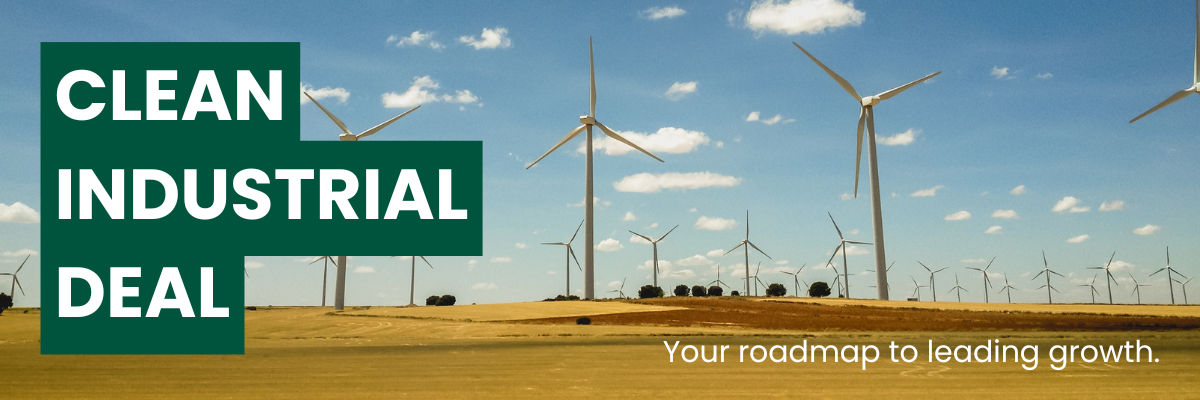
Written by Martijn Meijer
Dear reader,
Welcome to the latest edition of our EU Energy & Climate Policy Update. In this edition, we look at the status of the recommendations in the Draghi report one year after its publication. We also zoom in on some recent consultations opened by the European Commission, including one on energy security.
Europe’s bold plan for sustainable growth, the “Clean Industrial Deal”, represents a major shift for EU businesses, especially in energy-intensive sectors. Don’t miss your chance to engage with the Commission to shape this deal and influence the policy direction for the next five years.

The spotlight
Implementation of Draghi report keeps dragging on
On 9 September 2024, Mario Draghi published his report on European competitiveness. Billions in investments for the energy transition, European preference in procurement, and legislative simplifications to lower burdens on companies, among other recommendations. Draghi himself put it simply: adapt, and match the new world, or face “slow agony”.
A year after the publication of the report, the European Policy Innovation Council has published a report in which it found that only 11 percent of measures have been fully delivered, and only a third have had any progress. What does this mean for organisations active in the energy sector specifically?
What did Draghi recommend?
Draghi’s report, which was nearly 400 pages long, provided a sobering assessment of Europe’s economic challenges. It diagnosed a continent falling behind in productivity and innovation, facing fragmented capital markets, and struggling with an outdated industrial structure. To address this, he put forward 383 recommendations across a wide range of areas.
Key proposals included:
- A major push for a more integrated and unified European energy market, including joint purchasing of gas and faster grid expansion.
- Simplifying and streamlining regulatory burdens on businesses, with a focus on cutting reporting obligations for small and medium sized enterprises.
- Mobilising vast public and private investment, particularly for the energy transition and digitalisation, and creating a true single market for capital to finance this.
- Reforming competition law and state aid rules to support European companies in scaling up and competing globally.
What progress has been made on energy topics?
Progress in the energy sector has been notably slow, with the European Policy Innovation Council reporting that only around 15 per cent of related recommendations have seen any action, and none have been fully implemented. This is particularly concerning given the report’s emphasis on decarbonisation as a key to future competitiveness and energy independence. While the EU has shown a commitment to investment in grids and clean technology, the on-the-ground reality is that complex regulations and national interests continue to hinder progress. Proposals for a more unified energy grid and faster permitting for cross-border projects have largely stalled.
What impact will this have on companies?
The lack of decisive action on the Draghi report’s recommendations is having a direct and negative impact on European businesses. High energy prices, still significantly higher than those in the United States, are a persistent competitive drag, particularly for energy-intensive industries. Furthermore, the continued fragmentation of the single market makes it difficult for companies to scale up and compete with large American and Chinese firms.
Given this context, companies must ensure their voice is heard in Brussels. You should actively engage in dialogues with the European Commission and other policymakers. By voicing your concerns, the Commission could change its speed of operations to ensure the competitiveness of Europe. Want to know more about how to have your voice heard in Europe? Contact us for a call, and we can discuss.

Impact analysis for your business
Our free policy updates keep you informed, but is that enough? With our tailored EU Energy & Climate Policy Update you’ll receive:
- Custom insights on how upcoming policy changes might impact your business;
- Strategic advice from your dedicated policy consultant on how to turn challenges into opportunities;
- Early warnings about key legislative developments.

Policy updates
EU Commission proposes second MFF package
On 3 September, the European Commission adopted the second package of its new multiannual financial framework (MFF) for 2028–2034, covering seven sector-specific legal proposals. Key elements on energy and climate include the:
- Euratom Research and Training Programme: Proposed funding of €9.8 billion, with €4.0 billion dedicated to the ITER fusion project, €590 million for nuclear fission research, and €1.4 billion for fusion research.
- Instrument for Nuclear Safety Cooperation and Decommissioning: Almost €1 billion is proposed to merge existing programmes aimed at improving nuclear safety in Europe and third countries.
The proposals will now be negotiated by EU Member States and the European Parliament, with significant changes expected. For instance, the overall budget of €1.98 trillion proposed before the summer is likely to be reduced. Negotiations will continue through 2027, requiring unanimous approval by both the Council and Parliament.
2040 climate target discussions
On 18 September, EU environment ministers met at the Environment Council to discuss the EU’s long-term climate ambitions ahead of the Belém Climate Conference (COP30) in November. They agreed on a statement of intent committing the EU to reduce emissions by 66.25% to 72.5% by 2035 compared to 1990 levels, as an interim step toward the Commission’s proposed 90% net emissions reduction by 2040. The statement was designed to reassure the UN that the EU will submit its nationally determined contribution ahead of COP30.
A planned council vote on the 2040 target was cancelled due to push-back from key Member States, including France, Germany, Poland, and Italy. Member States remain divided on the level of ambition, the role of international carbon credits, national flexibility, cost-effectiveness criteria, and solidarity. They agreed to defer the decision to the European Council, leaving Heads of State and Government to resolve the issue.
European Council President António Costa indicated that the matter will be discussed at the upcoming European summit on 23–24 October, reflecting the ongoing negotiations and the challenge of aligning EU Member States on ambitious long-term climate goals.
EU launches €17.5 billion initiative to boost SME energy efficiency
On 11 September, the European Commission and the European Investment Bank (EIB) announced a €17.5 billion initiative to accelerate energy-efficiency investments in small and medium-sized enterprises (SMEs). The program aims to mobilise over €65 billion by 2027 and support around 350,000 companies. Funding will come through InvestEU and LIFE, targeting the investment gap SMEs face in improving energy efficiency compared to larger firms.
European Commission opens consultation on financing for energy-efficient building renovations
On 26 August, the European Commission opened a public consultation targeting the financial sector on lending for energy-efficient building renovations. The consultation will be used for a delegated act that aims to increase private lending for the renovation of the least efficient buildings. This act will fall under the Energy Performance of Buildings Directive (EPBD).
The initiative focuses on three main goals: increasing lending volumes for energy renovations, protecting vulnerable households, and providing guidance for lenders to prioritise the worst-performing buildings.
The consultation will remain open until 18 November, with a legislative proposal expected in Q1 2026.

Clean Industrial Deal
European Commission launches call for evidence to enhance energy security
In response to growing geopolitical instability, hybrid threats, and the accelerating energy transition, the European Commission has launched a review of the EU’s energy security legislative framework. This move follows strong calls for action from the European Council, the Council of the EU, and several former heads of government, and comes at a pivotal moment for Europe’s energy future.
Why Now? Lessons from the energy crisis
Between 2021 and 2023, the EU endured its most severe energy crisis since the 1970s oil shocks, driven largely by Russia’s full-scale invasion of Ukraine in early 2022 and the weaponisation of energy supplies. That crisis exposed several vulnerabilities in the EU’s energy system, from supply chain dependencies to the absence of robust emergency mechanisms.
Now, with energy independence and climate neutrality taking centre stage, the EU is seeking to future-proof its energy system against both traditional and emerging threats, such as cyberattacks, sabotage of critical infrastructure (like submarine cables and pipelines), but also climate-related disruptions and new forms of energy dependency on critical materials.
Identified challenges in the European energy landscape
The outcome of the Commission’s fitness check of the Gas Security of Supply Regulation and the Electricty Risk Preparedness Regulation identified key challenges and gaps, including:
- Lack of operational readiness for major supply disruptions;
- Poor integration between gas and electricity systems;
- Limited cross-border coordination, with national plans being developed in silo’s;
- Outdated regulatory frameworks that do not reflect upcoming priorities, such as electrification, hydrogen or decentralised energy production;
- Emerging external threats, such as foreign interference and infrastructure vulnerabilities.
The Commission aims to tackle these gaps by:
- Establishing robust emergency response mechanisms across all energy carriers;
- Enhance cross-sector and cross-border coordination;
- Include protection measures for consumers, SMEs and critical services;
- Take into account new threats such as climate change, cyberattacks and geopolitical dynamics;
- Enhance the diversification of energy supplies and technologies.
What’s next?
While the feedback period runs till the 13 October, it is expected that the Commission will presents its proposal for a revised regulation in H1 2026.
The review of the European energy architecture will result in an energy system that is more prepared, secure and resilient while supporting the competitiveness of the European industry recognising that secure, affordable and sustainable energy is a key precondition for economic resilience.
Reach out and do not miss your chance to help shape the backbone of Europe’s energy future!





